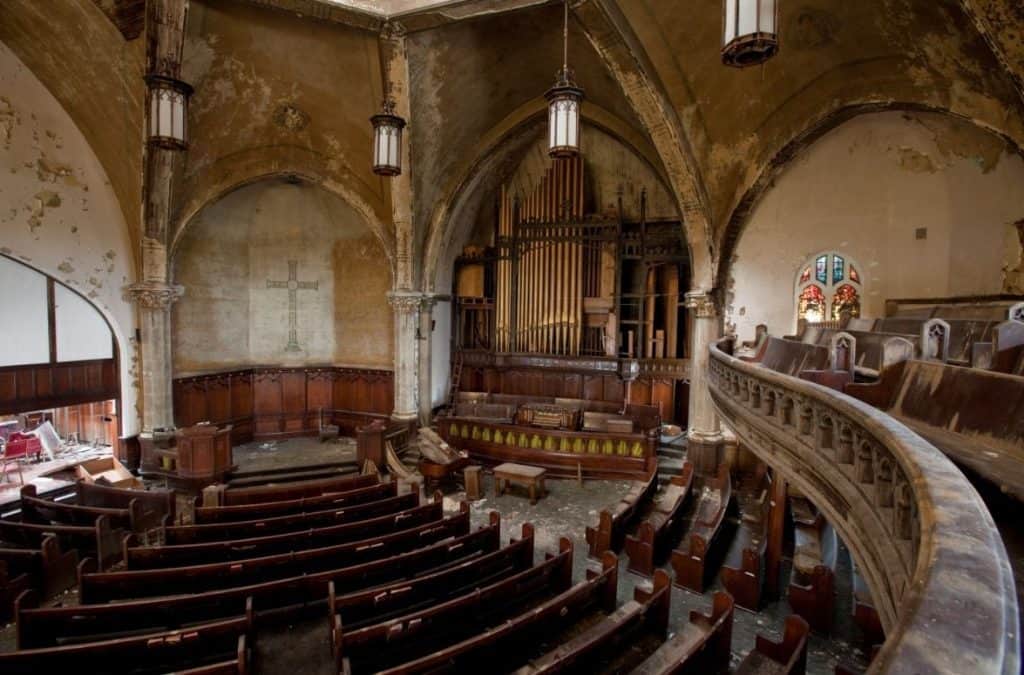John Calvin (1509-1564), the French pastor, theologian, and Protestant Reformer, wrote commentaries on many books of the Bible, but not all of them. Perhaps his most well-known commentary omission is on the book of Revelation.
Calvin never said why he didn’t write a Revelation commentary or his stated reason is lost to history. The speculations of historians as to why he didn’t, include: (1) he died before he got the chance, (2) he didn’t understand Revelation’s content, and (3) he had hermeneutical and theological reservations about it.
Each of these possibilities is described in more detail below. Additionally, the works of Calvin that may shed light on his views on Revelation will also be discussed. Keep reading to learn more.
Interested in Bible commentaries? See Best Bible Commentary Series: The Top 50 to learn more.

Did Calvin have the chance to write a Revelation commentary?
Calvin died at the age of 55, but his health was poor long before that. Though Calvin died in 1564, his health took a significant turn for the worse around 1558 or 1959. [1]
Reformed minister Robert Godfrey notes, “By 1559 his health problems were becoming great—regular bouts of malaria-like fever, tuberculosis, ulcerated veins, kidney stones, and hemorrhoids.” [2]
The Institutes of the Christian Religion
Believing death may be near, Calvin concentrated on refining and expanding the work that he is perhaps most known for, The Institutes of the Christian Religion (link goes to Amazon), which is his book of systematic theology.
Some suggest that given Calvin’s poor health, and that he focused on other works with the time and energy he had, he just didn’t get the chance to write a Revelation commentary.
The publication of Calvin’s commentaries
Calvin is considered one of the best Bible commentators in the history of Protestant Christianity. He wrote his first commentary on the book of Romans in 1540. His second commentary, which was on 1 Corinthians, appeared in 1546.
In the next five years, he completed commentaries on all of Paul’s epistles. By 1555 he completed commentaries on much of the rest of the New Testament, saving the Gospels and Acts for last.
There were omissions, however. Calvin didn’t write commentaries on 2 John, 3 John, or Revelation.
He also wrote Old Testament commentaries. Some of his Old Testament commentaries weren’t as refined as some of his other works, because they were largely unrefined lecture notes on individual books.
Calvin lived for nine years after he finished his last New Testament commentary. He wrote and refined others books during that time, so at the very least it could be said that Calvin didn’t prioritize writing a Revelation commentary.
Some suggest that he didn’t prioritize Revelation because he didn’t understand its content. Keep reading to learn more.
Also see Reformed Bible Commentaries

Did Calvin not understand Revelation?
Another theory as to why Calvin didn’t write a Revelation commentary is because he didn’t understand the book.
The apocalyptic genre
The apocalyptic genre is a literary style that is challenging for many readers to understand. It is argued that perhaps the symbolic imagery, like the seals, bowls, and trumpets, were beyond Calvin’s comprehension.
One response to this argument is that there was little about Scripture that Calvin didn’t understand. One doesn’t have to agree with him theologically to recognize that he had a superior intellect.
Many people acknowledge that the apocalyptic genre can be challenging to understand, yet Calvin seems to have interpreted the literary style without great difficulty when he encountered it in other places in Scripture. (More below.)
It may be more precise to say that Calvin wasn’t as interested in apocalyptic literature as he was in all the other parts of Scripture, rather than to conclude that his understanding was limited.
Did Calvin admit he didn’t understand Revelation?
Calvin allegedly said that he didn’t understand Revelation in a French biographical dictionary that was printed in the late 18th century.
- The writer of that entry of the dictionary wrote that Calvin said that he was not able to understand anything in so obscure a writer, whose name and history were not yet settled among the learned.
- The reference isn’t a quotation of Calvin, but the author summarizing what Calvin allegedly said.
However, T.H.L. Parker (1916-2016), a leading Calvin scholar who taught at the University of Durham, doesn’t believe Calvin ever said it. [3] He speculates that the non-quotation reference reflects the opinion of the dictionary writer, and not Calvin himself.
Did Calvin have theological concerns about Revelation?
What did Parker, an expert on Calvin’s life and ministry, believe as to why the French Reformer never wrote a commentary on Revelation? He speculates that Calvin associated the apocalyptic genre with Old Testament methods that hid Christ, rather than revealed him. Parker writes:
“Yet I believe that a theological reason may have deterred him from attempting Revelation. For him, the Old Testament proclaimed Christ in an obscure manner, but in the New Testament Christ had appeared in complete clearness. It was the difference between twilight and noon-tide.” (p. 119)
To understand Parker’s point in full, it’s important to know that Calvin wrote commentaries on Ezekiel and Daniel. Keep reading to learn why that’s important.
Can we know what Calvin would have said about Revelation?
Perhaps. Calvin wrote commentaries on Ezekiel and Daniel, both of which contain apocalyptic literature, like Revelation. A reader can use those Old Testament commentaries to get a sense of how Calvin would have understood the genre as it’s found in Revelation. Parker writes:
“Hence, apocalyptic, involving the use of allegory, was part of the Old Testament method of teaching; and he treated, even though more from a sense of duty than with pleasure, the apocalyptic parts of Ezekiel and Daniel, as witness his lectures on those books.
But he may have considered that apocalyptic is foreign to the New Testament as if it involved a re-veiling of the clear and unambiguous Gospel.” (Parker, p. 119))
In other words, Calvin may have said what he wanted to say about the apocalyptic genre in his Ezekiel and Daniel commentaries. Perhaps he thought that was sufficient and that he didn’t need to restate his views in a Revelation commentary.
One also gets the sense from Parker’s view that Calvin wasn’t as interested in the apocalyptic literature in the Bible as he was in other aspects.
Other considerations:
- Some of Calvin’s works haven’t survived. Some speculate that his Revelation commentary didn’t survive.
- Other 16th century writers mention Calvin’s commentary on Revelation. Parker researched these possibilities and concluded they were spurious or false. [4]
Parker concludes:
“Whatever his reasons, the fact remains that Calvin had the opportunity to complete his New Testament commentaries with 1 and 2 John and Revelation when he came to the end of the epistles, but preferred to ignore them and go on to the historical books and the Old Testament.
To that extent, therefore, we may say that he was imposing a practical canon on the New Testament.” (p. 119)
References:
[1] Source
[2] Crossway
[3] Google books
[4] Source
Recent Posts
David Jeremiah, a renowned pastor, author, and speaker, has captivated the hearts of many with his compelling sermons. His messages resonate deeply with diverse audiences, leaving an enduring...
Tim Keller, a distinguished pastor, theologian, and author, has garnered a devoted following through the profound impact of his sermons. In this article, we will explore seven compelling reasons...
